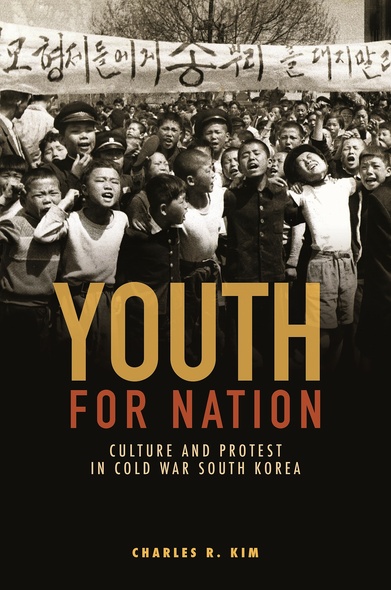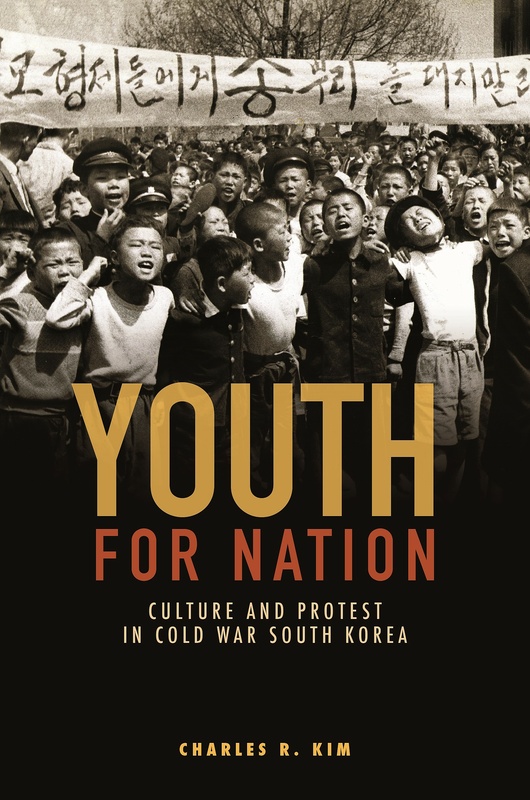
Youth for Nation
Culture and Protest in Cold War South Korea
This in-depth exploration of culture, media, and protest follows South Korea’s transition from the Korean War to the start of the political struggles and socioeconomic transformations of the Park Chung Hee era. Although the post–Korean War years are commonly remembered as a time of crisis and disarray, Charles Kim contends that they also created a formative and productive juncture in which South Koreans reworked pre-1945 constructions of national identity to meet the political and cultural needs of postcolonial nation-building. He explores how state ideologues and mainstream intellectuals expanded their efforts by elevating the nation’s youth as the core protagonist of a newly independent Korea. By designating students and young men and women as the hope and exemplars of the new nation-state, the discursive stage was set for the remarkable outburst of the April Revolution in 1960.
Kim’s interpretation of this seminal event underscores student participants’ recasting of anticolonial resistance memories into South Korea’s postcolonial politics. This pivotal innovation enabled protestors to circumvent the state’s official anticommunism and, in doing so, brought about the formation of a culture of protest that lay at the heart of the country’s democracy movement from the 1960s to the 1980s. The positioning of women as subordinates in the nation-building enterprise is also shown to be a direct translation of postwar and Cold War exigencies into the sphere of culture; this cultural conservatism went on to shape the terrain of gender relations in subsequent decades.
A meticulously researched cultural history, Youth for Nation illuminates the historical significance of the postwar period through a rigorous analysis of magazines, films, textbooks, archival documents, and personal testimonies. In addition to scholars and students of twentieth-century Korea, the book will be welcomed by those interested in Cold War cultures, social movements, and democratization in East Asia.
[Youth for Nation] warrant[s] a wide audience among scholars and students of Korean Studies as well as anyone interested in social protest and popular dissent movements. . . . enrich[es] our understanding of how a comprehensive treatment of South Korean democratization requires close attention to popular discourse, sensitivity to the implications of personal and social memory, and a temporal scope that spans several decades from the postwar period into the present.
In Youth for Nation, Charles R. Kim traces the emergence of South Korean educated ‘youths,’ namely high school and college students, as a crucial social force for modernization and democratization in the post-Korean War era. . . . Youth for Nation would be an invaluable resource for scholars and students working on the social and cultural history of twentieth-century Korea. . . . Kim’s study provides an astute analysis of the 1960 April Uprising and its impact on South Korea’s democratic trajectory in the 1970s and 1980s.
In Youth for Nation, C. Kim relies on diverse primary materials to construct the rich ‘cultural and social history’ (5) of the post war period. . . . By analyzing the narrative structure of symbols and themes salient in 1950s Korea, Youth for Nation helps us understand the unintended consequences of the state’s modernization discourse. . . . indispensable for understanding not only past and present Korea but also the global history of people’s movements.
Charles R. Kim’s Youth for Nation represents an impressive effort to trace the evolution of South Korean ideology from 1953 to 1964. . . . Given its successful tracing of a continuous discourse in South Korea’s early years, Youth for Nation is now an indispensable read for those seeking to understand the continuities in the history of South Korean ideology and student protest.
Thanks to Charles Kim’s superb new study of this period, such elision will no longer be possible, and the 1950s have now been revealed as a rich lode of historical meanings and connections that other scholars will also want to explore.
Youth for Nation opens up rich historical sources on mid-twentieth-century South Korean society and culture, particularly the host of journals and other publications that flourished during the period as well as films. Tackling a topic that has received little scholarly attention in English, it presents a ‘bottom-up’ process of Americanization and what the author calls ‘de-Japanization’ from the 1950s to early 1960s. It offers an intimate ethnographic portrayal of the Korean cultural scene with its pervasive anxieties about poverty, dizzying pace of modernization, and clashes between the old and the young, giving primacy to the voices of intellectuals and ordinary students. And while not focused exclusively on the April 19th Revolution of 1960, Youth for Nation fills a significant lacuna on the topic.
Eight years before the worldwide protests of 1968, students and intellectuals overthrew the South Korean government. Positioning the event as part of Korea’s transition from the colonial to the postcolonial, Charles Kim offers a wide-ranging and entertaining analysis of the unruly youth culture that drove the events of this April Revolution, the successes and failures of which presaged the tumultuous decades of democratic struggle to come. Kim’s Youth for Nation is a fascinating whirlwind of a book for anyone interested in South Korean politics or protest culture in general.
Charles R. Kim is Korea Foundation assistant professor of Korean studies in the History Department of the University of Wisconsin-Madison.




